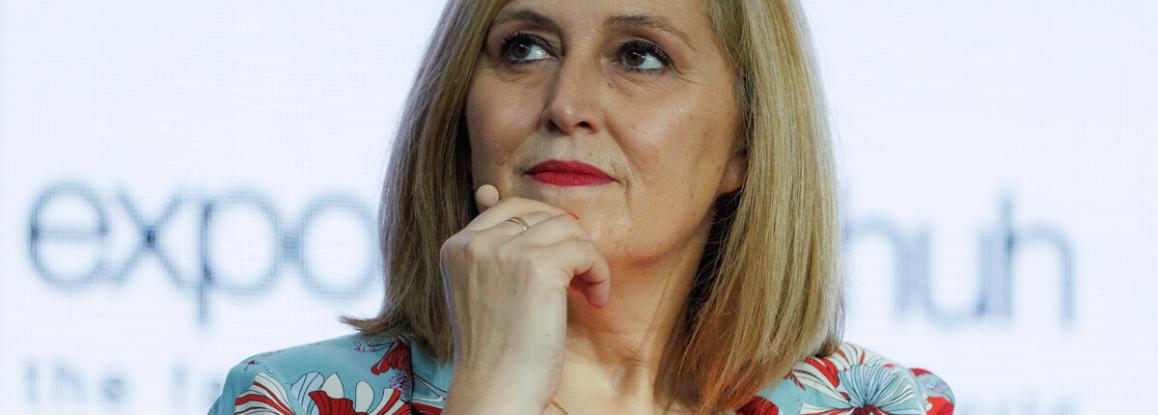In a market that often changes direction, Expo Riva Schuh and Gardabags remain opportunities for meeting and doing business. Alessandra Albarelli explains how trade fairs are tackling the new challenges of global trade, including the digitisation of consumption, the quality of Asian products and the growing role of Gardabags. A conversation about the future, guided by the awareness that yesterday's rules no longer apply.
The market situation remains very complicated. From your observatory and your continuous contacts with industry operators, what are the prospects for 2026?
«We are seeing a real overall paradigm shift. It is no longer a question of waiting for 'sales to pick up' or for consumption linked to traditional factors – such as the weather, the season or economic conditions – to return. Today, consumption is driven by completely new logic: digital channels, the culture of reuse and quality second-hand goods all have an impact. It is a profound change, both social and economic. Companies that are able to position themselves in a balanced way across different channels – physical and online – will continue to exist and grow; others will inevitably disappear. Expo Riva Schuh is less affected by the effects of the retail crisis, but it is observing the repercussions: companies are planning their participation more selectively, choosing strategic times of the year, often linked to their main collection. This is a natural selection of the market but, perhaps, also a sign of maturity. Meanwhile, the positive news is that visitors are planning their attendance at the fair in advance: registrations for the next editions of Expo Riva Schuh and Gardabags are going well and interest remains high, a sign that the desire to meet and do business is still alive.»
In a world that is turning towards regionalism, closure and almost punitive protectionism, Expo Riva Schuh and Gardabags seem like a rare exception that still believes in international openness...
«The world is increasingly global, even if purchasing dynamics tend to favour macro-regions and products with a territorial identity. But the product itself remains global. Over the last twenty years, the quality of materials, finishes and design has improved everywhere: today, Asian brands, for example, bring competitive and innovative products to the market, both in terms of technology and business models.
Expo Riva Schuh and Gardabags remain the places where this encounter between quality and competitiveness takes place in concrete terms. In recent years, our trade fair model has also changed: we are increasingly careful in selecting companies that can offer the right product for the European market, thus facilitating the connection between production and consumer markets.
There are closures, of course, but not in our sector: those who know how to produce well, with the right design and volumes, continue to resist and often evolve, moving from simple sourcing to the creation of their own brands. It is a supply chain that is transforming but continues to breathe internationality.»
The market continues to accumulate and present challenges for those working in the accessories sector: what resources have you introduced to support manufacturers, distributors and retailers?
«The direction we are taking can be explained well by taking as an example the work done on the concept that led to the debut of Gardabags last June: never start from the desire to fill the exhibition centre with exhibitors, but proceed with the needs of those we want to satisfy, the buyers, in mind. We studied the business interactions between manufacturers and retailers and identified three broad categories of buyers: those looking for companies for sourcing, those looking for medium-high level suppliers (sourcing for bridge) and those looking for brands that are ready to be included in their collections.
Gardabags was created to meet these three needs, simplifying the work of buyers and speeding up purchasing decisions. The aim is to put buyers in direct contact with manufacturers who are already accustomed to working to European standards, reducing the gap between supply and demand. In this way, the fair becomes a filter, both by country and by quality, type of production and business model, which facilitates choice and improves the quality of trade.»
Let's stay with Gardabags: how is it changing, if at all, after its debut?
«It is growing. It is no longer concentrated only in Hall B, but also extends to Hall A, with the aim of expanding and enriching the offer. We have strengthened the areas dedicated to sourcing for bridge and brands in particular, while maintaining the solidity of traditional sourcing.
We are welcoming new groups of exhibitors: among these, a representation of Pakistani companies and a good selection of Latin American manufacturers, to name just two examples. The growth is qualitative: the variety and consistency of the offering are what make Gardabags a benchmark for the sector today.»
As we approach the end of 2025, what experiences, both professional and business-related, have impressed you the most, and what ideas will you take with you into the next year?
«I take with me the feeling of a profound and rapid change in the market, which requires us to rethink everything: strategies, timing, working models. China remains an essential point of reference: even in a context of global and domestic difficulties, it continues to maintain its leadership, demonstrating an extraordinary ability to adapt.
The Chinese model confirms that in our sector nothing is static, nothing can be taken for granted. The old rules no longer apply. As trade fairs, we must continue to interpret change, adapting our model and our offering. After all, the success of Expo Riva Schuh and Gardabags lies precisely in thinking outside the box, while remaining faithful to our international vocation.»
Editor - Fotoshoe Magazine


